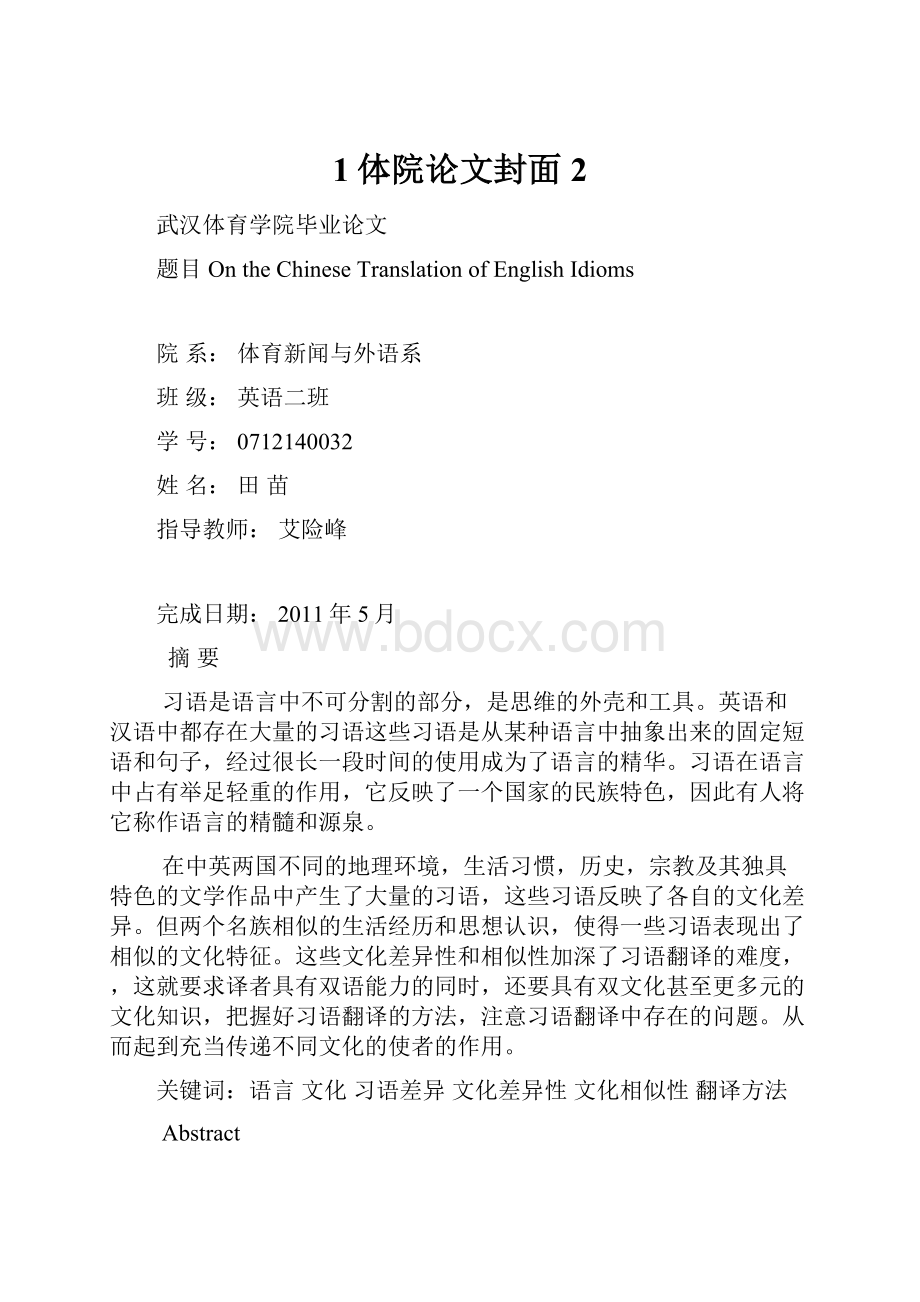1体院论文封面2.docx
《1体院论文封面2.docx》由会员分享,可在线阅读,更多相关《1体院论文封面2.docx(13页珍藏版)》请在冰豆网上搜索。

1体院论文封面2
武汉体育学院毕业论文
题目OntheChineseTranslationofEnglishIdioms
院系:
体育新闻与外语系
班级:
英语二班
学号:
0712140032
姓名:
田苗
指导教师:
艾险峰
完成日期:
2011年5月
摘要
习语是语言中不可分割的部分,是思维的外壳和工具。
英语和汉语中都存在大量的习语这些习语是从某种语言中抽象出来的固定短语和句子,经过很长一段时间的使用成为了语言的精华。
习语在语言中占有举足轻重的作用,它反映了一个国家的民族特色,因此有人将它称作语言的精髓和源泉。
在中英两国不同的地理环境,生活习惯,历史,宗教及其独具特色的文学作品中产生了大量的习语,这些习语反映了各自的文化差异。
但两个名族相似的生活经历和思想认识,使得一些习语表现出了相似的文化特征。
这些文化差异性和相似性加深了习语翻译的难度,,这就要求译者具有双语能力的同时,还要具有双文化甚至更多元的文化知识,把握好习语翻译的方法,注意习语翻译中存在的问题。
从而起到充当传递不同文化的使者的作用。
关键词:
语言文化习语差异文化差异性文化相似性翻译方法
Abstract
Idioms,beingaspecialandinseparablepartoflanguage,aretheinstrumentandshellofthinking.TherehaveexistedalargenumberofidiomsinbothEnglishandChinese,whicharesetphrasesorsentencesabstractedfromlanguage.Theyformanessentialpartofthewholevocabularyoflanguage,whichreflectthenationalcolorsofthenativespeakersandaresaidtobeconsideredasthesinewofthelanguage.
Idiomreflectsculturaldifferences.Becauseofthesimilarexperiencesandthinkingpatterns,someidiomssharetheculturalsimilarities.Withthedifferencesandsimilarities,idiomstranslationisaveryhardwork;itrequiresthetranslatorsshouldhavebilingualcompetenceandbiculturalevenmulticulturalknowledge.Atthesametime,translatorsshouldmasterthemethodsofidiomtranslationandplayattentiontoproblemsinidiomtranslation.
Keywords:
languageculture;idiomtranslation;culturaldifference;
Culturalsimilarities;methodsofidiomtranslation
Contents
1,Introduction........................................................................................
1.1TheunderstandingofEnglishidioms.....................................
1.2ThesourcesofEnglishidioms..................................................
2,ThecomparisonbetweenChineseidiomsandEnglishidioms..............
2.1SimilaritiesbetweenEnglishidiomsandChineseidioms............
2.2differencesbetweenEnglishidiomsandChineseidioms..........
3,SevenpracticaltranslatingwaysofEnglishidioms...............................
3.1Literaltranslation........................................................................
3.2Literaltranslationwithnotes.......................................................
3.3Liberaltranslation......................................................................
3.4Liberaltranslationwithnotes....................................................
3.5Liberaltranslationwithnotes......................................................
3.6Combinationofliteralandliteraltranslation...............................
3.7Rhetoricaldevices......................................................................
4,Conclusion........................................................................................
Bibliography.......................................................................................
1)Introduction
1.1)TheunderstandingofEnglishidioms
Idiomistheessenceoflanguage.Itconsistsofplentifulsocialandculturalconnotations.Comparedwithotherlanguagecomponents,idiomsisthetypicallanguagewhichreflectstheculturalfeatures.Generallyspeaking,“idiomconsistsofsetphrasesandshortsentences,whicharepeculiartothelanguageinquestionloadedwiththenativeculturesandideas”(Zhangweiyou).Exceptthedefinition,idiomsalsoincludesproverbs,maxims,andfamousphrases,evensomeslangs.Therearemanyidiomswhichrefertodifferentenvironmentsinwesternandeasterncountries.Someidiomsarecreatedfromliteralworks.Thelivinghabitsarealsoreflectedinsomeidioms.Sometimes,Becauseofthesimilarexperience,EnglishandChineseidiomshavesimilarculturalfeatures.Thecross-culturalcommunicationinthetwocountriescreateslotsofnewidiomsandculturalfeaturesandcausesomedifficultiesinunderstanding,butthemajorityreflectthedifferentlanguagehabitstandingtheseidiomsfornon-nativespeakers,especiallyinidiomcommunicationapplicationandtranslation,soidiomtranslationinvolvestransmissionofculturalinformation.Inotherwords,itbringsinmutualunderstandingofthetwopeoplesandshowsthevariousculturalfeaturesthroughsourcelanguagetothetargetlanguage.InordertotranslateEnglishidiomsintoChinesecorrectly,thetranslatorshouldknowthemeaningofidioms,beawareofbetweentheculturalfeaturesandemphasizethesimilaritiesanddifferencesbetweenEnglishandChineseidioms.
1.2ThesourcesofEnglishidioms
Itiswell-knownthatidiomsaremainlyformedorcreatedbypeopleduringtheirdailylife.Tomuchdegree,theyarethenaturaloutcomeoftheworkingpeople'slifepracticeandexperience.Forexample,“ploughthesands”isinfactaboutagriculture;“toknowtheropes”isfromnavigationoriginally;“neckandneck”isoutofhorseracing;“aliveandkicking”isrelatedtofishing.
Inaddition,cultureandreligionarethemajorsourcesofEnglishidioms.AlargenumberofEnglishidiomscomefromtheBible,suchas,“thepatienceofJob”meansgreatpatience;“notknowsomebodyfromAdam”meanstheonewhoisaperfectstranger.Theidiomslike“outofjoint”and“hitthemark”arefromthewritingofWilliamShakespeare.Otherslike"cryforthemoon"and“neversaydie”arefromCharlesDickens'works.FromtheGreekmythscomesanidiom“theAchillesHeel”whichmeantheonlydeadlyweakpoint.Thusfromtheaboveexamples,itisnotdifficulttofindoutthatEnglishidiomsarecloselyconnectedwithPeople'scommonlife,literature,religion,ancientlegendsandfables.
2)TheComparisonbetweenEnglishidiomsandChineseidioms
ThecomparisonbetweenEnglishidiomsandChineseidiomscanbeconcludedintwoaspects;correspondingrelationandnon-correspondingrelation.
1.SimilaritiesbetweenEnglishidiomsandChineseidioms
“Correspondingrelationmeansthetwodifferenttypesofidiomscoincideinmeaningandform,becauseofsimilarculturesandexperiences”(zhangpeiji)AlthoughtheEnglishcultureisfundamentallydifferentfromtheChineseone,intheirstruggleagainstnatureandtheirobservationoftheworld,theydrewsomeconclusionsandgainedsomeperceptionoftheworld.Thensomeoftheidiomscanexchangetheculturalinformationdirectlywithoutmanydifficultiestounderstand,thatistosaysomeEnglishidiomscanbetranslatedintocorrespondingChineseone.Forexample,inthetwocountries,peopleregard“heart”as“soul,thoughtandemotion”,sotherearealotidiomsrelatedto“heart”,theChinesesay“心情沉重”,whiletheBritishsay“withaheavyheart”forthat,and“heartandsoul”for“全心全意”Herearemoreexamples:
1)Wallshaveears隔墙有耳
Asforthemeaningandthewordcomponents,theyaresimilartoeachother.Thisidiomcomesfromastory:
longtimeago,aqueenbuiltsomespecialwallsaroundhercourt.Shecouldhearwhatotherssaidveryclearlyinanotherroom.Inthisway,thequeengotalotoftopsecretsandsecretplans.BoththeEnglishandtheChineseidiommean“eventhemostsecretandprivateconversationmaybecomeknowntootherpeople”Becauseofthesamemeaningandwordcomponents,thetwoidiomsarecorrespondingtoeachother.
2)Asnowyear,arichyear瑞雪兆丰年
Eventhoughsomeproverbscanreflecttheknowledgeaboutscience,therearenotscientificresearchesaboutthemeaningofidioms;wecansaythatidiomsareresultedfromexperiences.Someidiomsinwesternandeasterncountriescanreflectthesimilarexperience.Forinstance:
Awolfinsheep'sclothing披着羊皮的狼
Toloseface丢面子
SomeoftheaboveidiomsborrowalargenumberofexpressionsfromChinese.Theborrowedidiomsenrichthewayofexpressing,andstillmaintainthepreviousformandmeaning,sotheycanrefertothesimilarculturalcharacteristics.
3)WheninRome,doasromansdo入乡随俗
Thisidiomexplainsthat“peopleshouldconfirmtothemnnersandcustomsofthoseamongstwhomtheylive”
Everypotterpraiseshisownpot.王婆卖瓜自卖自夸
Thisidiomexplainsthat“peopleareloathtothedefectsintheirposessionsortheirmembers”.
ThetwoidiomsreflectthattherearealargenumbercorrespondingcoincidencesbetweenEnglishandChineseidioms.
2,DifferencesbetweenEnglishandChineseidioms
Englishisthecommonlanguageintheworld;itreferstotheEnglishcultureandtradition.Englishculture,whichisacomplexsystem,coversmanyaspects:
knowledge,art,belief,moralandcustom.WhiletranslatingtheEnglishidioms,thetranslatormustbefamiliarwiththecultureandhistoryofthecountries,sinceidiomsreflectthedifferentaspectsofpeople'slife.
1)Thedifferencesoflivingenvironments
TheoriginsoftheEnglishidiomsarerelatedtothelifeandmanuallabour.Englandisanislandcountry;theirlifeisconnectedwiththeseaandwater,whichshowsthecoastalculture.WhileChinaisacontinentalcountry,weattachmuchimportancetotheland.Thesetwokindsofcultureshavegreatimpactsonidioms,forinstance:
theEnglishsay“挥金如土”forthat.Thetwoidiomsmean“wastingmoney”.
InEnglish,theraremanyidiomsrelatedtoboatandwater,buttherearenocorrespondingidiomsinChinese,suchas:
Torestonone'soars暂时歇一歇
Tokeepone'sheadabovewaters奋力图存
Allatsea不知所措
Theabovethreeidiomsreflectthegeographicalfeatures;wecannotunderstandthemeaningunlesswearefamiliarwiththeenvironment.AsforChineseculture,“eastwind”means“thewindinspring”,butinEngland,the“westwind”standsforspring,becauseEnglandislocatedinthewestglobeandenjoyscoastalclimate.
2)Thedifferencesofcustoms
Thecustomsisthewayofliving;itconveysmanyaspectsandhasimpactonpolitics,economy,religionandliterature.Languageisthespecialcomponentofcultureandreflectsthecustom.Idiomsarenotexception,especiallytheanimalidioms.Wetakedogsforexample,theChinesehavenegativeatti